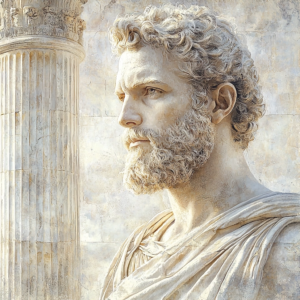Stoic Courage: The Virtue of Strength and Resilience 🛡️
Courage: The Stoic Answer to Fear and Challenges
Courage is one of the four central cardinal virtues in Stoicism. For the Stoics, courage is not merely about confronting danger, but about possessing the inner strength to remain steadfast in the face of adversity. This virtue represents a commitment to reason and the belief in one’s ability to navigate challenges with composure and determination. In an unpredictable world, courage is the anchor that keeps us grounded and helps us move forward with purpose and confidence.
Courage in Stoicism: What It Truly Means
In Stoicism, courage is not reckless bravery but a thoughtful act rooted in the understanding that inner strength and reason guide us. Epictetus said, “No man is free who is not master of himself.” This wisdom reveals that courage brings freedom—the freedom to live authentically and make tough decisions without being dominated by fear or doubt. Stoic courage encompasses three key aspects:
- Bravery: Facing challenges with dignity and calm.
- Resilience: The perseverance to uphold your principles under pressure.
- Self-Confidence: Trusting in your ability to overcome obstacles with reason and inner peace.
Historical Context: Courage in Action
Numerous Stoics exemplified the virtue of courage. One of the most notable is Cato the Younger, known for his unwavering integrity and resistance to tyranny. He stood firm in his principles, even in the face of grave danger. Another admirable example is Arulenus Rusticus, who risked his life to defend his Stoic beliefs against oppressive forces. These figures remind us that courage is evident in both grand gestures of defiance and quiet acts of resilience.
Courage in Modern Life: Applying Stoic Principles
Courage is not reserved for historical heroes. In modern life, this virtue helps us tackle challenges and live a fulfilling existence. Here are practical ways to practice Stoic courage in your daily life:
- Facing conflicts: Approach difficult conversations with calm and openness instead of avoiding them.
- Overcoming setbacks: Use failures as opportunities for self-reflection and growth.
- Building self-confidence: Trust your abilities and values even when the path ahead is uncertain.
A Stoic Quote on Courage
“Courage is not the absence of fear but the realization that something else is more important than fear.” – Epictetus
How Will You Show Courage?
Consider how you can apply Stoic courage in your life. What challenges lie ahead for you? Start small: show calm in tough situations, stand by your principles, and view setbacks as opportunities for growth. Courage is a virtue that flourishes through action, so take the first step today!
Courage: The Stoic Path to Strength
Stoic courage is more than fearlessness; it’s the ability to act with resolve in the face of challenges and uncertainty. In a world filled with obstacles, this virtue empowers us to confront adversity with inner strength and dignity. But what does courage truly mean in our daily lives? Explore the wisdom of the Stoics to discover how this timeless virtue can guide you through life’s trials.
Bravery: Facing Danger with Stoic Courage 🛡️
Bravery in Stoicism is about confronting fear and uncertainty with rational thought and strength. It is a commitment to do what is right, even in the face of adversity.
Epictetus taught: “No great thing is created suddenly.” Bravery allows us to endure challenges and make meaningful decisions without succumbing to irrational fears.
Perseverance: Endurance in Adversity in Stoicism 🌟
Perseverance, a key component of Stoic courage, teaches us the value of persistence in the face of difficulty. It is through endurance that we grow and overcome life’s obstacles.
The life of Musonius Rufus is a testament to perseverance; exiled multiple times, he remained steadfast in his principles. This virtue inspires us to approach hardships with resilience and purpose.
Determination: Steadfastness in Action through Stoicism ⚖️
Determination is the drive to remain resolute in our choices and actions. In Stoicism, it is about aligning your actions with your values and staying the course, no matter the challenges.
Marcus Aurelius exemplified this determination, writing: “You have power over your mind – not outside events. Realize this, and you will find strength.” Let determination guide you in your pursuit of virtue.
Self-Confidence: Trust in One’s Abilities through Stoicism 🌟
Self-confidence in Stoicism is built on a foundation of self-awareness and trust in one’s abilities. It empowers us to navigate life’s uncertainties with clarity and conviction.
Seneca advised: “It is not the man who has too little, but the man who craves more, that is poor.” This virtue teaches us to find strength within and face life with boldness and humility.
Risk-Taking: Calculated Risks in Stoic Courage 🔮
Risk-taking in Stoicism involves measured decisions, balancing courage with wisdom. It is not about recklessness, but about embracing uncertainty with a rational and fearless mind.
Archedemus of Tarsus embodied this mindset, encouraging his students to step out of their comfort zones to achieve greatness. Learn to embrace calculated risks and unlock your potential.
Calmness: Maintaining Composure Under Pressure in Stoicism 🌿
Calmness is the ability to maintain serenity and clarity under pressure. For the Stoics, this virtue was the foundation of strength and resilience.
Hierocles taught that calmness begins with understanding what lies within our control. Cultivate this virtue to face life’s storms with grace and steadiness.
Embrace Stoic Courage Today
Cultivating courage in the Stoic sense means stepping forward with confidence, regardless of external circumstances. By embodying this virtue, you can navigate life’s challenges with resilience and purpose. Take the first step toward building unshakable inner strength today.
Please Note
Stoic exercises and practices are meant to inspire, not instruct. For personal guidance, please consult an expert. Stoic Practices: Disclaimer








